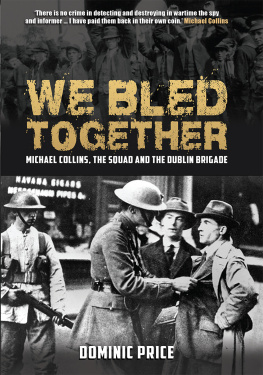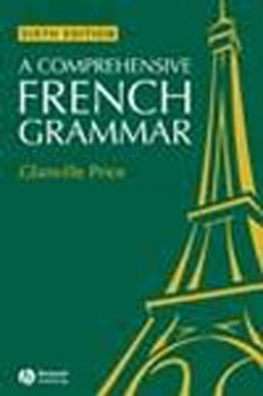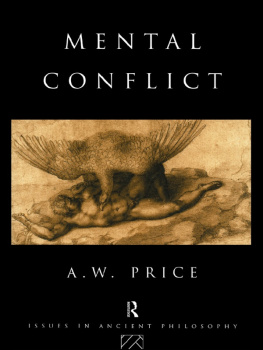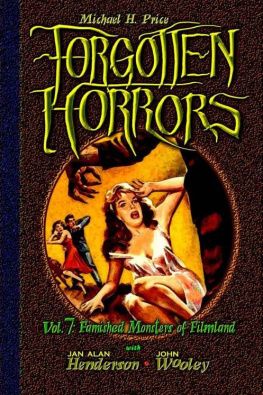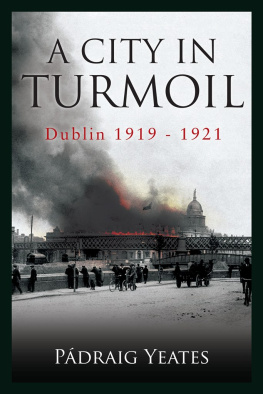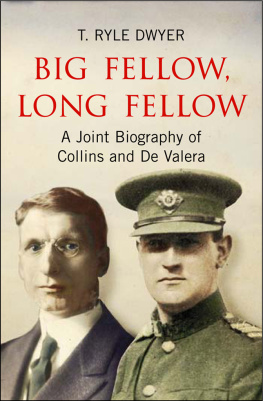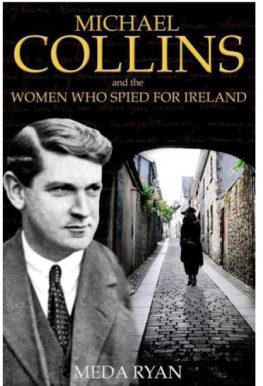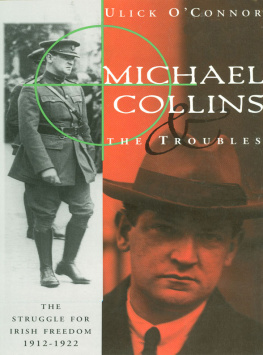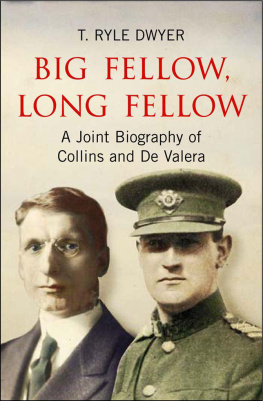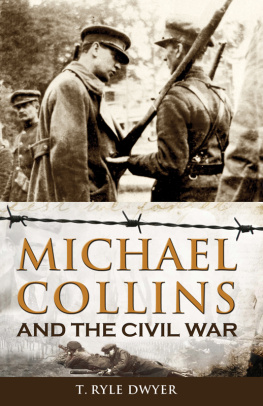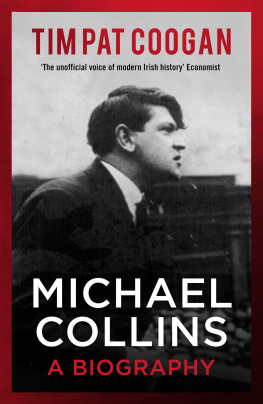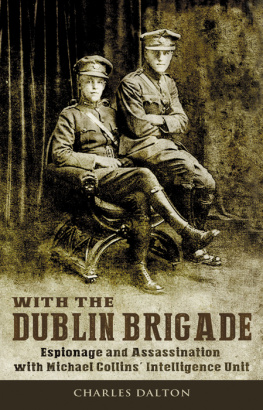



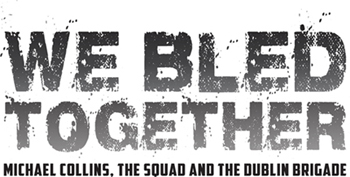
Tiomnaithe dibh sid a thug a mbeatha ar son saoirse na hireann.
Dedicated to those who gave their lives for Irish freedom.
Contents
M y thanks are due to the following for their help and expertise in the course of my research: the staff at Ballyroan Library, South Dublin County Council; Eoin Brennan; Niamh Brennan; Dr John Bourne, Western Front Association; Celio Burke; Damien Burke, Irish Jesuit Archives; Lisa Carley; Neil G. Cobbett, National Archives, Kew, UK; Sle Coleman, Local Studies, South Dublin County Council Libraries; Marianne Cosgrave, Mercy Congregational Archives; Raychel Coyle, Phoenix Park OPW; Eithne Daly; Richard Davies, Regimental Museum of the Royal Welsh; Noelle Dowling, Dublin Diocesan Archives; Mired Foley, Archives of the Roman Catholic Archdiocese of Perth, Highgate, Western Australia; Hugh Forrester, PSNI Museum; Declan Furey; Paddy Furlong; Liz Gillis; David Hanley; Michael Hanley, Dublin Diocesan Archives; Samus Haughey, Oireachtas Library and Research Centre; Patricia Healy, Kenmare; Tim Horgan, County Kerry; Grinne Hughes; the staff at the Imperial War Museum, Lambeth, London; Karen Johnson, Archivist, Christian Brothers Province Centre; Commandant Padraic Kennedy; Dr Clair Kilgarriff; Commandant Stephen MacEoin, Officer in Charge, Military Archives, and civilian archivist staff Hugh Beckett, Lisa Dolan and Noelle Grothier; Grinne McCaffrey, Provincials Office, Irish Province of the Dominican Order; Niall McCarville; Dr John McCullen, Chief Park Superintendent, Phoenix Park (retired); Finn McCumhaill; Brian McGee, Cork City & County Archivist; Senator Michael McDowell; Berni Metcalfe, National Library of Ireland; Peter Molloy; Stephen Moriarty, Cahersiveen; Terry Moylan, Archivist, Na Pobair Uilleann; amon and Terry Newell; Elan Owen, Llyfrgell Genedlaethol Cymru/National Library of Wales; Maureen OConnor-OSullivan, Cahersiveen Library; Patrick OConnor-Scarteen, Kenmare; amon Cuv TD; Dr Rory OHanlon; the staff at the Oireachtas Library & Research Service; Cormac K. H. OMalley; Christine Pullen, Curator, Royal Green Jackets (Rifles) Museum, Winchester UK; Siobhn Ryan, Heritage Officer, Sligo County Council; Sandra Shallow-Brennan; Pat Shannon; Laurence Spring, Surrey History Centre; Dave Swift, Claomh Irish Living History and Military Heritage, The British Library, London; the staff at the library, NUI Maynooth; the staff at the The National Archives, Kew, London; the staff at the The National Archives of Ireland; Aoife Torpey, Kilmainham Gaol; UCD Archives; Michael Walsh, Cahersiveen; Ian Whyte.
I am also indebted to Brendan Kelly, John Nolan and Aidan OToole, former members of staff at Drimnagh Castle CBS, for sharing their knowledge of Dublin in the Rare Auld Times.
I wish also to thank The Collins Press for all their hard work, advice and belief in this project.
My heartfelt thanks to Dominic, Pauline and David Price for their generosity and time for engaging in so much discussion and debate.
I especially pay tribute to my wife Catherine, to whom I am deeply grateful. Her love, support and encouragement were an inspiration on the long trek through the research, study and writing of this history. I also thank my children, Heather, Emma and Shane, for their love, patience and understanding. This history could not have been written without them.
11 April 1912 | Third Home Rule Bill introduced to House of Commons |
31 January 1913 | UVF founded |
24/25 April 1913 | Larne gunrunning |
26 July 1913 | Howth gunrunning |
August 1913January 1914 | Dublin workers are locked out of places of employment for being members of the ITGWU trade union |
23 November 1913 | Irish Citizen Army founded |
25 November 1913 | Irish Volunteers founded |
4 August 1914 | Outbreak of the First World War |
15 September 1914 | Home Rule suspended until after the war |
20 September 1914 | John Redmond speech at Woodenbridge County results in split in the Irish Volunteer movement |
2429 April 1916 | Easter Rising takes place |
312 May 1916 | Fifteen leaders of the Rising executed |
3 August 1916 | Roger Casement executed |
1917 | Republican prisoners released from Frongoch under terms of a general amnesty |
October 1917 | De Valera elected President of Sinn Fin |
November 1917 | De Valera elected President of the Irish Volunteer movement |
11 July 1917 | Death of DI Mills, the first policeman killed in Dublin since the Easter Rising |
January 1918 | An t-glach, the Irish Volunteer paper, is reintroduced |
April 1918 | Conscription crisis begins |
May 1918 | Lord French appointed as Lord Lieutenant of Ireland |
June 1918 | Dick McKee elected Commandant of the Dublin Brigade |
11 November 1918 | Armistice signed which ends the First World War |
28 December 1918 | General election leading to Sinn Fin victory and the collapse of Irish Parliamentary Party |
21 January 1919 | Dil ireann meets for the first time; ambush by Irish Volunteers at Soloheadbeg in Tipperary beginning the War of Independence |
January 1919 | Sen T. OCeallaigh dispatched by the Dil to the Versailles Peace Conference |
3 February 1919 | De Valera escapes from Lincoln Gaol |
2021 March 1919 | Dublin Brigade raid on the RAF aerodrome at Collinstown, County Dublin |
April 1919 | Michael Collins and Sen Nunan gain access to G Division secret files room at DMP Station on Brunswick Street |
June 1919 | amon de Valera departs for the US |
July 1919 | First Special Duties Unit of the Dublin Brigade formed under the command of 2nd Battalion QM, Michael McDonnell |
30 July 1919 | Special Duties Unit carry out first assassination: DS Patrick Smyth |
20 August 1919 | Irish Volunteers swear allegiance to Dil ireann and are now known as the IRA |
September 1919 | Second Special Duties Unit of the Dublin Brigade formed under the command of O/C B Company 2nd Battalion Paddy ODaly |
December 1919 | Lily Mernin, a typist at Dublin Castle, becomes an intelligence agent for the IRA |
Next page
